Psyllium Husk (Plantago ovata): Husk Isabgol Explained, Uses, and Benefits – 2025

When I first started cultivating Plantago ovata in the rich soils of Pakistan decades ago, I never imagined how profoundly husk isabgol would impact global health and wellness. This remarkable natural fiber, known variously as psyllium husk, ispaghula husk, or simply isabgol, has been a cornerstone of traditional medicine in South Asia for centuries – and now, modern science confirms what our ancestors knew all along.
What is psyllium husk, exactly? It’s the outer coating of tiny seeds from the Plantago ovata plant, processed into a fine, pale fiber that holds extraordinary health benefits. Whether you’re dealing with digestive issues, managing cholesterol, or simply looking to add more natural fiber to your diet, understanding husk isabgol can transform your wellness journey.
In this comprehensive guide, I’ll share everything I’ve learned from growing, processing, and researching this incredible plant. From the Psyllium Husk scientific name, Plantago ovata ispaghula husk, to practical daily uses, you’ll discover why this ancient remedy deserves a place in modern healthcare. Let me take you through the complete story of nature’s purest fiber.
What Is Psyllium Husk (Isabgol)?
Let me start by answering the most fundamental question: what is psyllium husk? In its simplest form, husk isabgol is the outer layer of the seed coat from the Plantago ovata plant. These seeds are incredibly small – about the size of a sesame seed – but their husk contains one of nature’s most powerful sources of soluble fiber.
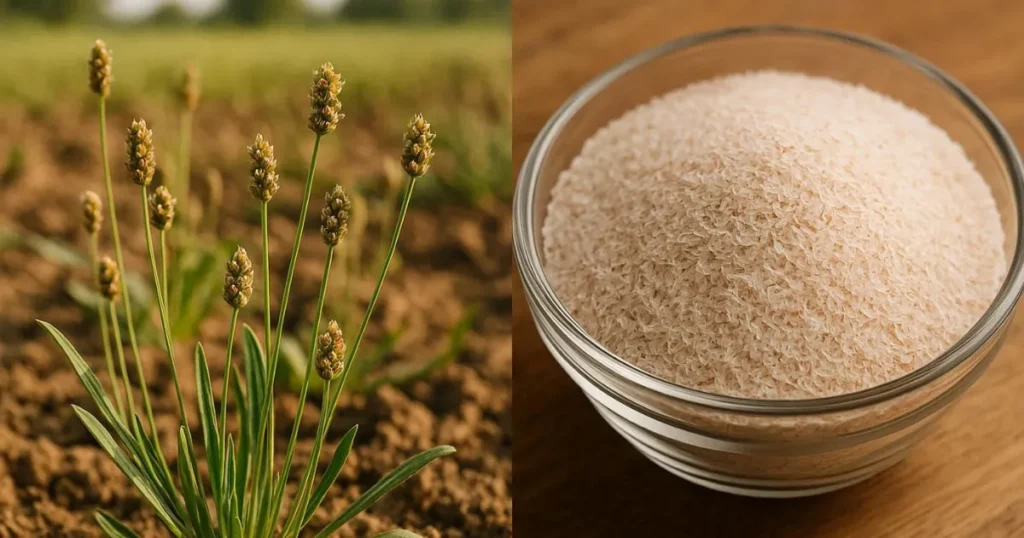
The Nature of Isabgol Fiber
When I harvest isabgol in Pakistan, we carefully separate the husk from the seed kernel through a specialized milling process. The husk itself is what makes this fiber so special. It’s rich in mucilage, a complex polysaccharide that absorbs water and forms a gel-like mass. This unique property is exactly what makes husk isabgol so effective for digestive health.
Here’s what happens, when you mix isabgol with water, the fiber swells to roughly 8-10 times its original volume. This expansion creates a soft, bulky gel that moves through your digestive system, collecting waste and promoting regular bowel movements. It’s gentle, natural, and remarkably effective.
Traditional Uses Through History
In Ayurvedic medicine, isabgol has been used for thousands of years as a cooling agent and digestive aid. Ancient texts describe it as a remedy for everything from constipation to intestinal inflammation. Unani medicine, practiced widely in South Asia and the Middle East, similarly prizes husk isabgol for its ability to cleanse the digestive tract and balance the body’s internal systems.
What fascinates me is how traditional wisdom and modern science align so perfectly. The same properties that ancient healers recognized – the cooling effect, the gentle action, the complete digestibility – are exactly what researchers now validate in clinical studies.
Understanding the Names
You might be wondering why this one product has so many names. Let me clarify, “Isabgol,” “Ispaghula,” and “Psyllium” all refer to the same product derived from Plantago ovata seeds. The differences are purely regional and linguistic.
In Pakistan, India, and Middle Eastern countries, we call it “isabgol” or “ispaghula.” The word “isabgol” comes from Persian, literally meaning “horse’s ear,” referring to the shape of the plant’s leaves. In Western markets and on supplement labels, you’ll see “psyllium husk” or “psyllium fiber.” It’s all the same healing fiber – just different names reflecting where and how it’s used.
This linguistic diversity sometimes confuses people, but it actually speaks to how widely this fiber is valued across cultures. From traditional bazaars in Lahore to health food stores in Los Angeles, husk isabgol serves the same purpose: supporting digestive wellness naturally.
Scientific Background – Plantago ovata (Ispaghula Husk).
As someone who works with this plant daily, understanding the science behind husk isabgol helps you appreciate its true value. Let me share what makes Plantago ovata scientifically remarkable.
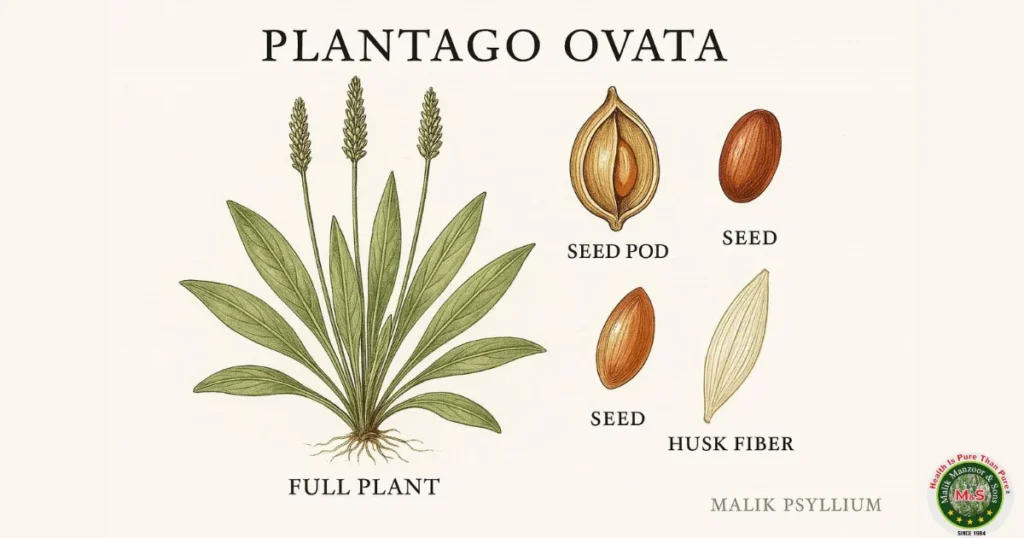
The Botanical Profile.
The Psyllium Husk scientific name is Plantago ovata Forssk., named after the botanist Peter Forsskål, who documented it. This plant belongs to the Plantaginaceae family, which includes about 250 species worldwide, though only a few produce the quality fiber we seek.
Plantago ovata is native to the Subcontinent, specifically thriving in the arid and semi-arid regions of Pakistan and India. In Pakistan, we cultivate it primarily in Punjab and Sindh provinces, where the soil composition and climate create ideal growing conditions. The plant requires specific temperature fluctuations between day and night to develop the mucilage-rich seed coating that makes the fiber so effective.
The plant itself stands about 30-45 centimeters tall, with narrow leaves and small white or pale pink flowers that develop into seed pods. Each tiny pod contains 2-4 seeds, and it’s the delicate husk surrounding these seeds that becomes the isabgol you use for health.
Chemical Composition and Properties.
What makes Plantago ovata ispaghula husk so special? The answer lies in its chemical makeup. Husk isabgol contains approximately 70-80% soluble fiber and 20-30% insoluble fiber. This ratio is nearly perfect for digestive health – the soluble fiber does the heavy lifting for cholesterol and blood sugar management, while the insoluble fiber provides bulk and promotes regularity.
The key compound in isabgol is mucilage, a complex mixture of polysaccharides including arabinose, xylose, and galacturonic acid. When these polysaccharides encounter water, they form a viscous gel through hydrogen bonding. This isn’t just interesting chemistry – it’s the mechanism that makes isabgol effective for everything from constipation relief to cholesterol reduction.
From a nutritional standpoint, husk isabgol is remarkably low in calories – about 35 calories per tablespoon – yet provides roughly 7 grams of fiber. That’s approximately 28% of your daily fiber needs in just one small serving. It contains minimal protein, virtually no fat, and negligible amounts of vitamins or minerals. Isabgol is pure fiber, which is what makes it so versatile.
Why Pakistani Isabgol Leads the World.
Here’s something I take great pride in, Pakistan together account for over 80% of global psyllium husk production. This isn’t by accident. The specific soil mineral composition, the temperature variations, and the cultivation expertise passed down through generations create isabgol with superior swelling capacity and purity.
At Malik Psyllium, we cultivate our crops in carefully selected regions of Pakistan where the swelling index – a measure of how much the fiber expands in water – consistently exceeds international standards. The purity levels we achieve, often 95-99%, are recognized globally. When you see “Made in Pakistan” on isabgol, you’re getting a product from the world’s premier growing region.
Fun Fact: South Asia isn’t just the largest producer – it’s the birthplace of isabgol cultivation science. The agricultural techniques, harvest timing, and processing methods developed here over centuries remain unmatched anywhere else in the world.
Ispaghula Husk vs Psyllium Husk – Are They the Same?
This question comes up constantly, and I completely understand the confusion. Let me settle this once and for all with a definitive comparison.
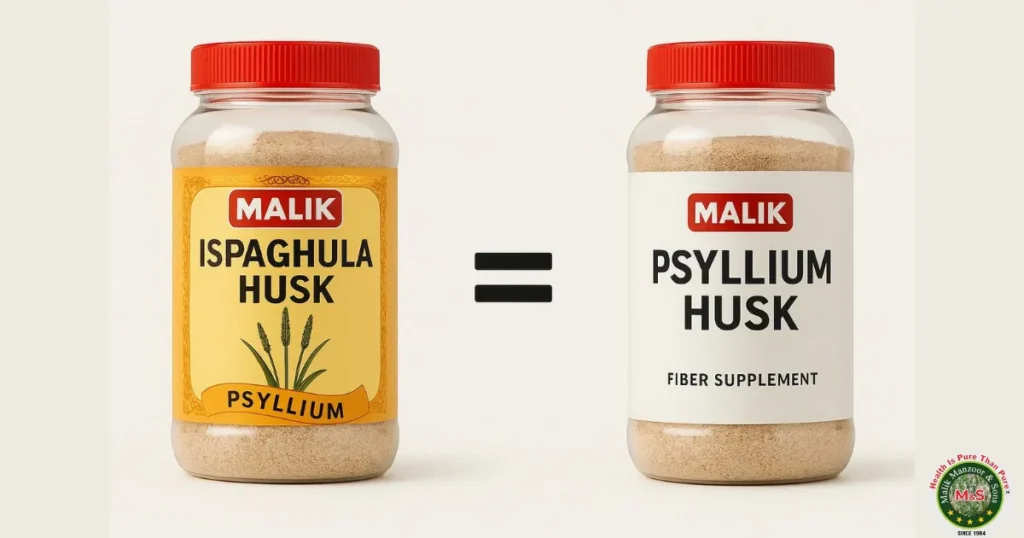
The Short Answer of Ispaghula Husk Vs Psyllium Husk.
Yes, ispaghula husk and psyllium husk are exactly the same product. Both are derived from the seeds of Plantago ovata, processed in identical ways, and deliver identical health benefits. The difference is purely linguistic and regional – it’s a naming convention, not a botanical or chemical distinction.
Understanding the Terminology.
Ispaghula husk is the term predominantly used in Asia – Pakistan, India, Bangladesh, and Middle Eastern countries. If you walk into a traditional medicine shop or pharmacy in Karachi, Lahore, Mumbai, or Dubai, you’ll ask for “isabgol” or “ispaghula.” This is the authentic, traditional name that’s been used for centuries.
Psyllium husk is the anglicized term adopted for Western markets, scientific literature, and international trade. When the fiber was introduced to Europe and North America, “psyllium” became the standard terminology. You’ll see this on supplement bottles, in research papers, and in health food stores across Western countries.
In my work exporting from Pakistan to global markets, I use both terms interchangeably depending on my audience. The product in the package remains exactly the same – pure Plantago ovata seed husk.
Detailed Comparison.
Let me break down the comparison more thoroughly:
| Feature | Ispaghula Husk | Psyllium Husk |
| Source | Plantago ovata | Plantago ovata |
| Geographic Origin | Subcontinent (Pakistan, India) | Same source, global marketing name |
| Primary Use | Natural laxative, traditional medicine, home remedy | Dietary fiber supplement, functional food ingredient |
| Common Form | Often sold as whole flakes or coarse husk | Available as fine powder, capsules, or whole husk |
| Packaging | Traditional packaging, local brands | Standardized supplement packaging |
| Terminology Usage | Asian and Middle Eastern markets | Western markets, scientific publications |
| Fiber Content | 70-80% soluble fiber | 70-80% soluble fiber (identical) |
| Effectiveness | Identical health benefits | Identical health benefits |
Why the Confusion Exists.
The confusion between these terms arises from marketing and cultural differences. When I ship isabgol internationally, Western importers often rebrand it as “psyllium husk powder” because that’s what their customers recognize. Meanwhile, the exact same product shipping to Middle Eastern markets retains the “ispaghula” label.
Some people believe psyllium husk is more refined or processed than ispaghula, but this isn’t accurate. The processing methods are identical. Whether it’s ground into fine powder or left as coarser flakes depends on the intended use, not the terminology.
The Bottom Line.
Whether you call it isabgol, ispaghula husk, or psyllium husk, you’re talking about the same healing fiber from Plantago ovata. The name on the package doesn’t change what’s inside. What matters is the quality, purity, and freshness of the husk itself.
At Malik Psyllium, we use both terms depending on our market, but our commitment to quality remains constant. The fiber we harvest and process in Pakistan is the same whether it’s labeled for Asian or Western markets – pure, effective, and grown with generations of expertise.
Benefits of Husk Isabgol (Plantago ovata).
After decades of working with isabgol and witnessing its effects on countless people, I can confidently say this fiber delivers some of the most impressive health benefits found in any natural supplement. Let me share what both science and experience have taught me.

Digestive Health and Regularity.
This is where husk isabgol truly shines. The soluble fiber absorbs water in your intestines, creating soft, bulky stools that pass easily. Unlike harsh chemical laxatives that force your system into action, isabgol works with your body’s natural rhythms.
I’ve had customers tell me they’ve struggled with chronic constipation for years, trying everything from medications to extreme diets. Within days of starting isabgol with proper hydration, they experience relief. The fiber doesn’t just treat symptoms – it helps restore normal digestive function over time.
For those dealing with diarrhea, isabgol might seem counterintuitive, but it actually helps here, too. The fiber absorbs excess water in the intestines, adding form to loose stools. This dual action – softening hard stools and firming loose ones – makes it remarkably versatile.
Heart Health and Cholesterol Management.
Clinical studies have consistently shown that regular consumption of Plantago ovata ispaghula husk can lower LDL (bad cholesterol) by 5-10%. The mechanism is fascinating, the soluble fiber binds to bile acids in your digestive system. Your liver must then use cholesterol from your bloodstream to produce more bile, effectively removing cholesterol from circulation.
I’ve seen laboratory reports from customers whose cholesterol numbers improved significantly after three months of consistent isabgol use. For those managing cardiovascular health, this natural approach offers a valuable complement to diet and exercise.
The heart benefits extend beyond cholesterol. Some research suggests husk isabgol may help maintain healthy blood pressure levels, though this effect is generally more modest than the cholesterol impact.
Weight Management Support.
Isabgol isn’t a magic weight-loss pill. However, it’s an incredibly effective tool when combined with healthy eating. When you take husk isabgol 20-30 minutes before meals with plenty of water, it expands in your stomach, creating genuine feelings of fullness.
This natural appetite suppression helps you eat smaller portions without feeling deprived. Over time, this translates to reduced calorie intake and gradual, sustainable weight loss. I’ve seen people lose 5-10 kilograms over several months simply by incorporating isabgol into their routine and making modest dietary improvements.
The fiber also helps reduce fat absorption to some degree, though this shouldn’t be relied upon as a primary weight-loss mechanism. The real value is in portion control and improved satiety.
Blood Sugar Regulation.
For individuals with diabetes or prediabetes, husk isabgol offers remarkable benefits. The gel-forming fiber slows the digestion and absorption of carbohydrates, preventing the sharp blood sugar spikes that occur after meals. This means more stable energy throughout the day and better long-term glucose control.
Multiple studies have documented improvements in fasting blood sugar and HbA1c levels with regular isabgol consumption. I always recommend that diabetics consult their healthcare provider before starting, because as blood sugar improves, medication dosages may need adjustment.
Detoxification and Gut Health.
As isabgol moves through your digestive tract, it acts like a gentle broom, collecting toxins, undigested food particles, and waste materials. This cleansing action supports overall colon health and may reduce the risk of digestive disorders.
Recent research has revealed that husk isabgol acts as a prebiotic, feeding beneficial gut bacteria. A healthy microbiome affects everything from immunity to mood, making this one of the most underappreciated benefits of regular use.
Pro Tip: Always drink a full glass of water – at least 250ml – with husk isabgol to prevent dehydration or choking. The fiber needs liquid to work properly. This isn’t optional; it’s essential for both safety and effectiveness.
Practical Ways to Use Husk Isabgol.
Understanding what is psyllium husk is one thing; knowing how to use it effectively is another. Let me share the methods that work best based on my experience and customer feedback.
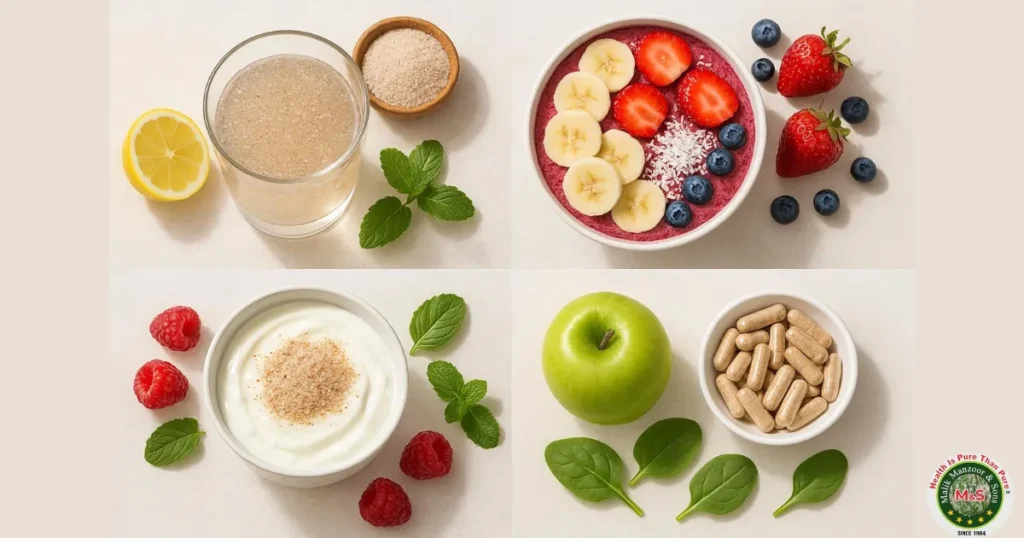
The Classic Method.
This is the traditional approach used throughout South Asia for generations:
Mix 1-2 teaspoons of husk isabgol into a glass (250ml) of lukewarm water. Stir quickly and drink immediately – it thickens within seconds. Follow with another glass of plain water. Take this before bed for overnight action or first thing in the morning on an empty stomach.
This method is ideal for digestive health and constipation relief. The lukewarm water helps the fiber disperse evenly and makes it easier to drink.
Weight Loss Preparation.
For appetite control and weight management:
Combine 1 teaspoon of isabgol with 250ml of room-temperature water and the juice of half a lemon. Add a teaspoon of honey if desired. Drink this 20-30 minutes before your main meals.
The lemon adds flavor and vitamin C, while the timing ensures the fiber expands in your stomach before you eat, promoting natural portion control.
In Food and Beverages.
Husk isabgol is incredibly versatile for cooking and beverages:
- Smoothies: Add 1 teaspoon to your morning smoothie. Blend briefly – over-blending makes it too thick.
- Yogurt: Stir into fresh yogurt or curd with a pinch of cardamom.
- Soups: Mix into warm soups just before serving for added fiber.
- Baking: Use as a gluten-free binder in breads and muffins (approximately 1 teaspoon per cup of flour).
Supplement Form.
Many people prefer the convenience of capsules or tablets containing plantago ovata ispaghula husk. These work identically to the powder but are easier for travel or busy schedules. Just ensure you drink plenty of water with them.
Usage Guidelines by Purpose.
| Health Goal | Recommended Form | Dosage | Best Timing |
| Constipation Relief | Whole husk in water | 1-2 tsp daily | Before bed |
| Weight Management | Husk in lemon water | 1 tsp, 2-3 times | 30 min before meals |
| Cholesterol Control | Husk powder or capsules | 1-2 tsp daily | With meals |
| Blood Sugar Control | Husk with milk | 1 tsp, twice daily | Before main meals |
| General Fiber Boost | Mixed in smoothies | 1 tsp daily | Morning |
How to Store Husk Isabgol for Maximum Freshness.
Proper storage makes a huge difference in maintaining the quality and effectiveness of your isabgol. Here’s what I recommend based on how we handle it in Pakistan.
Basic Storage Principles.
Keep husk isabgol in an airtight container away from heat, direct sunlight, and moisture. Glass jars with tight-sealing lids work best. Stainless steel containers are also excellent. If using the original packaging, transfer it to a better container once opened.
Never use wet spoons or hands in your isabgol container. Even a small amount of moisture can cause clumping and potentially promote mold growth. I keep a dedicated dry spoon specifically for isabgol.
Shelf Life Expectations.
Unopened packages of husk isabgol typically last 2-3 years from the manufacturing date when stored properly. Once opened, aim to use it within 6-12 months for optimal freshness and effectiveness.
Whole husk tends to last longer than finely ground powder because it has less surface area exposed to air. If you’re buying in bulk, consider this when choosing your form.
Climate Considerations.
In Pakistan’s hot and humid seasons, I recommend storing isabgol in a cool, dry pantry – not in the refrigerator unless you live in extremely humid conditions. Temperature fluctuations from moving containers in and out of the fridge can actually introduce moisture through condensation.
For those in tropical or very humid climates, adding food-grade silica gel packets to your storage container can help absorb any ambient moisture.
Husk Isabgol in Global Perspective.
The journey of isabgol from the fields of Pakistan to health stores worldwide is something I find remarkable. Let me share how this local treasure became a global staple.
International Recognition and Use.
Today, psyllium husk is used in over 70 countries as a natural dietary fiber supplement. What started as a traditional South Asian remedy is now recognized by health authorities worldwide, including the FDA in the United States, which acknowledges its role in heart health and cholesterol management.
The pharmaceutical industry uses husk isabgol as an ingredient in countless medications, particularly those for digestive health. The food industry incorporates it into gluten-free products, baked goods, and functional foods. Its ability to absorb water and create structure makes it invaluable beyond just direct supplementation.
The South Asian Advantage.
Pakistan and some parts of India are heartland of plantago ovata cultivation. Together, these regions supply roughly 80% of the world’s isabgol. This isn’t just about volume – it’s about quality.
The specific growing conditions in South Asia – the soil mineral content, the temperature variations, the expertise passed down through generations – produce isabgol with superior swelling capacity and purity. When international buyers specify “Pakistani” psyllium, they’re seeking this proven quality.
At Malik Psyllium, we’re proud to be part of this tradition. Our cultivation practices combine ancestral knowledge with modern quality control, ensuring that the isabgol we export meets the highest international standards.
Popular Brands and Market.
Several brands have made plantago ovata ispaghula husk accessible globally. Beyond Malik Psyllium, brands like Sat-Isabgol in India, Organic India, and various Western supplement companies source their fiber from Pakistan and India, repackaging it for different markets.
The global market for psyllium husk continues to grow as more people seek natural, plant-based solutions for digestive health. What our ancestors used intuitively, modern consumers now choose based on scientific evidence and personal experience.
Global Impact: The fiber industry supported by isabgol cultivation provides livelihoods for thousands of farming families across Pakistan and India, making it not just a health product but an economic cornerstone for rural communities.
What is isabgol husk made from?
Husk isabgol is made from the outer coating of seeds from the Plantago ovata plant. After the plant matures and produces seed pods, we harvest and dry the seeds, then use specialized milling equipment to separate the thin, fiber-rich husk from the inner seed kernel. This husk is what becomes the isabgol powder or flakes you use for health. It’s a 100% natural plant fiber with no additives or processing chemicals.
Is psyllium husk the same as ispaghula husk?
Yes, psyllium husk and ispaghula husk are exactly the same product. Both terms refer to the fiber derived from Plantago ovata seeds. The difference is purely linguistic -” ispaghula” or “isabgol” is the traditional name used in South Asia and Middle Eastern countries. At the same time, “psyllium” is the term adopted for Western markets and scientific literature. The fiber itself, its composition, and its health benefits are identical regardless of which name appears on the package.
What is the scientific name of psyllium husk?
The scientific name of psyllium husk is Plantago ovata Forssk., named after botanist Peter Forsskål. The plant belongs to the Plantaginaceae family. When you see “plantago ovata ispaghula husk” on labels, this refers to the complete botanical identification of the fiber. This scientific classification helps distinguish it from other Plantago species that don’t produce the same quality fiber for health use.
Is isabgol safe to take daily?
Yes, husk isabgol is safe to take daily for most people when consumed with sufficient water. I recommend starting with 1 teaspoon daily and gradually increasing to 1-2 teaspoons twice daily if needed. The key is drinking at least 250ml of water with each dose and maintaining good hydration throughout the day. Daily use can support digestive health, manage cholesterol, and regulate blood sugar. However, people taking medications should consult their healthcare provider, as isabgol can affect medication absorption.
How much isabgol should I take per day?
The typical recommended dosage is 1-2 teaspoons (5-10 grams) of husk isabgol daily, taken once or twice per day. Beginners should start with just 1 teaspoon once daily for the first week to allow their digestive system to adjust. You can then increase to 2 teaspoons twice daily if needed for specific health goals. Never exceed 3 tablespoons (30 grams) daily without medical supervision. Always take each dose with at least one full glass of water.
Can I use Isabgol for weight loss?
Yes, husk isabgol can support weight loss efforts when combined with a healthy diet and exercise. The soluble fiber expands in your stomach when taken with water 20-30 minutes before meals, creating feelings of fullness that help you eat smaller portions naturally. This isn’t a magic solution – you still need to make good food choices – but isabgol makes portion control significantly easier. Many people find it helps reduce snacking and overeating. Take 1 teaspoon with water before your main meals for best results.
What’s the difference between psyllium husk powder and whole husk?
Both come from plantago ovata ispaghula husk, but whole husk consists of larger, flakier pieces while powder is finely ground. Whole husk typically lasts longer in storage due to less surface area exposure, but powder mixes more easily into liquids and foods. The health benefits are identical – choose based on your preference and how you plan to use it. Powder is more convenient for smoothies and cooking, while whole husk is traditional for the classic water method.
Does isabgol expire, and how should I store it?
Yes, husk isabgol does expire. Unopened packages last 2-3 years from the manufacturing date, while opened containers should be used within 6-12 months. Store it in an airtight container in a cool, dry place away from direct sunlight and moisture. Always use a dry spoon – never let wet utensils touch your isabgol. You can tell it’s expired if it develops a musty smell, darkens in color, becomes clumpy, or fails to swell properly in water. Fresh isabgol should be pale colored, fluffy, and expand 8-10 times when mixed with water.
Conclusion – Husk Isabgol: Nature’s Purest Fiber
After everything I’ve shared about plantago ovata ispaghula husk, I hope you understand why I’m so passionate about this remarkable natural fiber. From the fields where we carefully cultivate Plantago ovata in Pakistan to the countless lives it improves worldwide, husk isabgol represents the perfect intersection of traditional wisdom and modern science.
Whether you call it psyllium husk, ispaghula, or isabgol, you’re talking about the same powerful fiber with scientifically proven benefits for digestive health, cholesterol management, blood sugar control, and overall wellness. The fact that this simple seed husk can address so many common health concerns naturally, without harsh chemicals or side effects, makes it truly exceptional.
What is psyllium husk? It’s more than just fiber – it’s a daily wellness practice that connects you to centuries of healing tradition while supporting your body’s modern health needs. It’s sustainable, effective, and remarkably affordable considering its benefits.
As someone who’s dedicated their life to cultivating and sharing this gift from nature, I encourage you to experience the difference quality husk isabgol can make. Start with small amounts, stay well-hydrated, and give your body time to adjust. Within weeks, you’ll likely notice improvements in digestion, energy, and overall wellbeing.
At Malik Psyllium, we’re committed to providing the purest, most effective isabgol sourced directly from Pakistan’s premier growing regions. Every batch represents generations of expertise and unwavering quality standards. Your health deserves nothing less. Add a spoonful of husk isabgol to your daily routine – a small habit with profound health rewards that nature intended all along.
Malik Shabbir
Featured Blogs
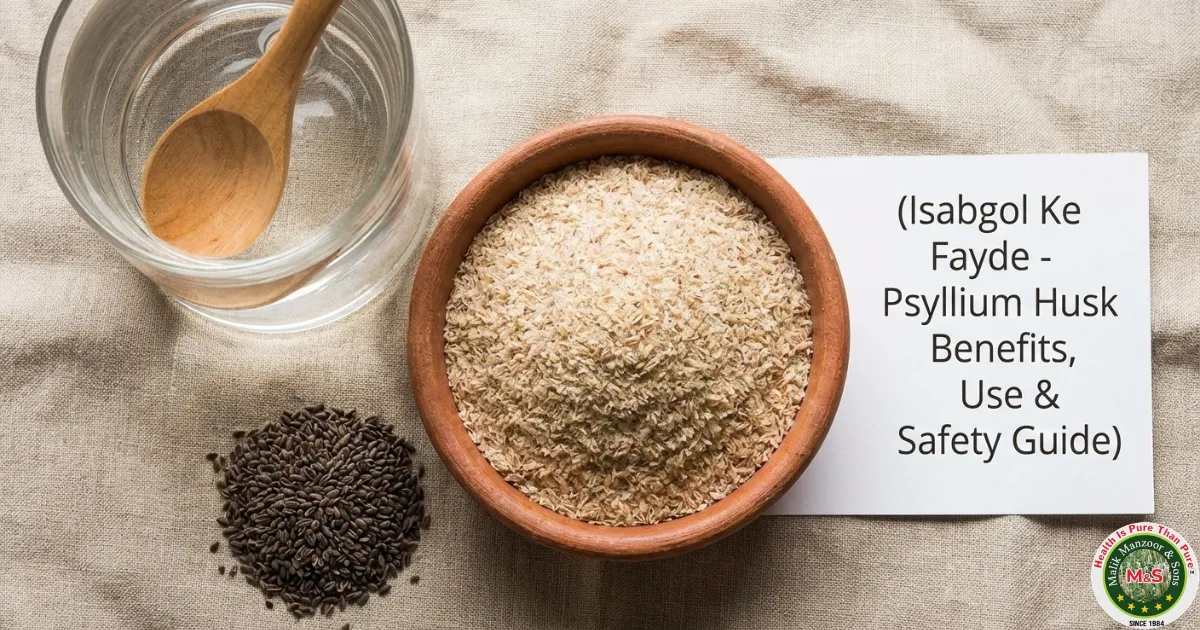
Isabgol Ke Fayde – Psyllium Husk Ke Poori Science-Based Rahnumayi – 2026
Isabgol ke fayde jaanna aaj ke daur mein zyada zaroori
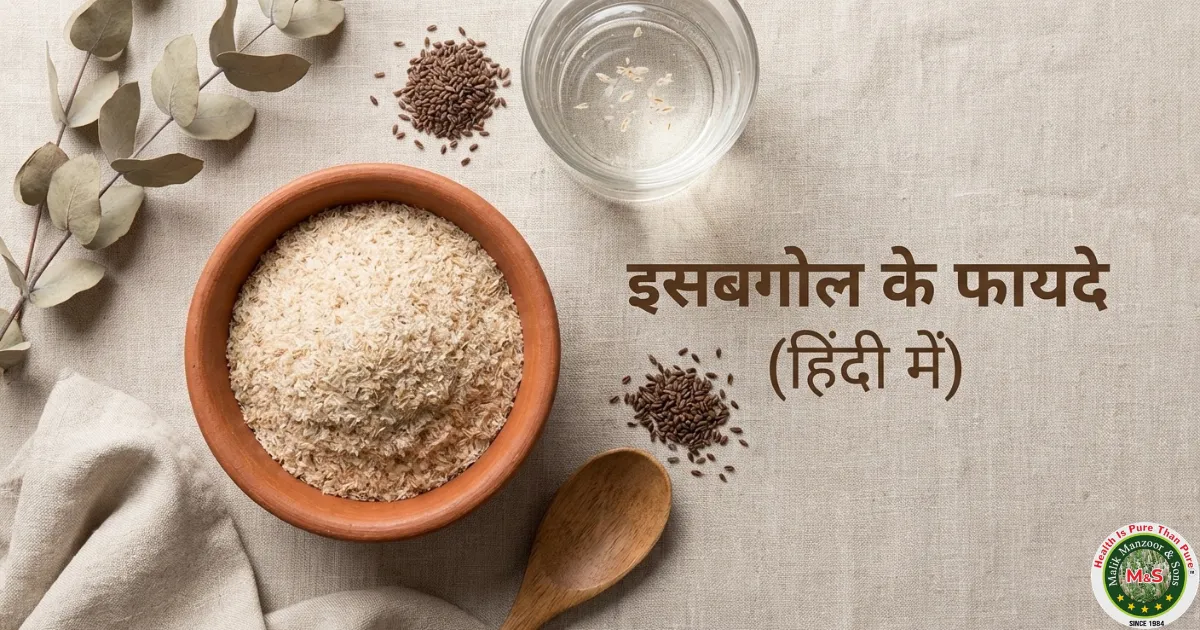
Isabgol Benefits in Hindi | Psyllium Husk Ke Fayde, Sahi Upyog Aur Savdhaniyan – 2026
Agar aap isabgol benefits in hindi mein samajhna chahte hain,
